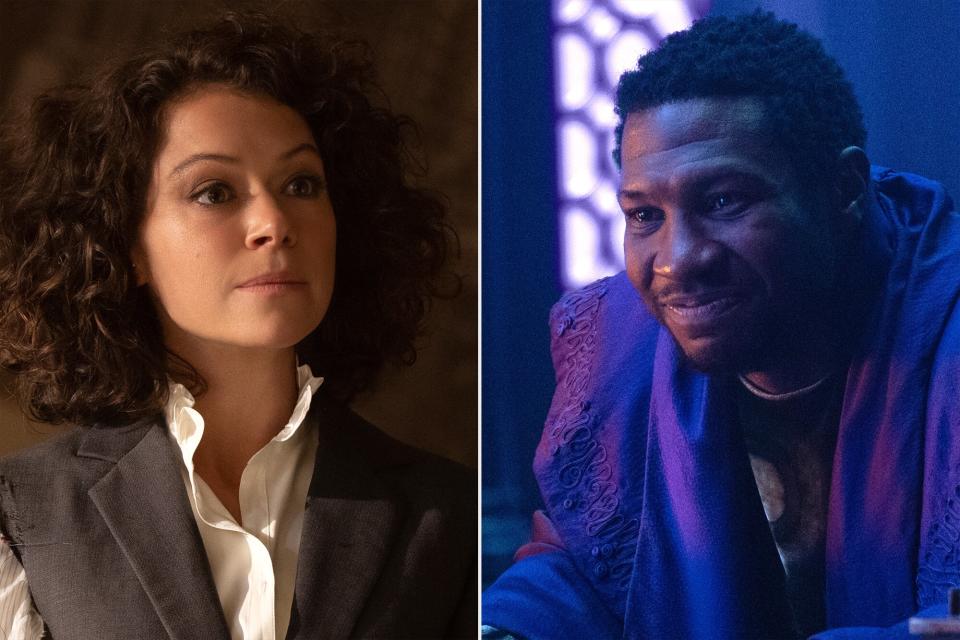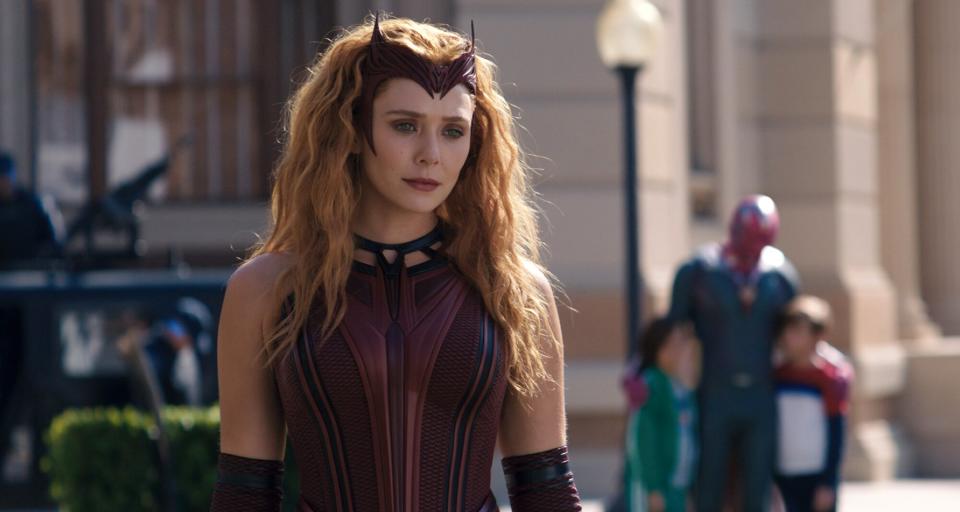What was Marvel Phase 4?
- Oops!Something went wrong.Please try again later.
- Oops!Something went wrong.Please try again later.
"Everyone pays attention when I'm this," says She-Hulk (Tatiana Maslany). Jennifer Walters was a deputy district attorney with student loans. Her gamma-charged alter ego gets a corporate salary and dances with Megan Thee Stallion. Men swipe right on She-Hulk. Disney+ greenlights her spin-off. "Would the same guys who like She-Hulk," she worries, "stick around for Jen?"
She-Hulk: Attorney at Law is the best TV series in the Marvel Cinematic Universe because it is fine. Seven okay-at-best movies, eight patchy shows, two endearingly dopey specials: The megafranchise's fourth phase was its biggest and worst. I stopped mid-Loki, but I caught up this month in anticipation of Ant-Man 3 launching Phase 5. I don't recommend the rapid intake. Phase 4 was repetitively about repetition. All titles could pluralize: Black Widows, Spider-Men, Wanda and the Visions, Moon Knight v Moon Knight. Also: So much amnesia. Marvel Studios invented the Hollywood Chris era, so greater diversity was solid penance. But old identities multiplied. Guys dueled over Captain America's shield. Thor's ex became "a Thor," which turned the Thor on. Loki loved a Loki. Less creepily, Hawkeye helped a Hawkeye enthusiast Hawkeye up.

Chuck Zlotnick/Marvel Studios (2) Tatiana Maslany in 'She-Hulk'; Jonathan Majors in 'Ant-Man'
Not all females wanted to rebrand male legacies. "The Black Panther is a relic!" said the new Black Panther. "I don't want to be a Hulk!" said a new Hulk. Moon Knight's Khonshu desired Moon Knight's wife as his next Moon Knight, a lost subplot on a rapturously dumb show. Are all new characters just reboots? Young super-powered super fans didn't mind. Ms. Marvel cosplayed Captain Marvel. "I'm a huge fan!" Shang-Chi told Wong, which is about how iron-hearted Riri greeted her famous kidnapper ("You're Princess Shuri!").
Pre-Infinity War, Thor's hammer got emasculated to pieces and Black Panther suggested T'Challa was kinda clueless. Phase 4 demanded more reverence, and more more. Thus came the multiverse, and the multiverse sucks. Promising infinite possibilities, it delivered replication. Loki met Lokis who were memes of Loki-ness. Three Spider-Men were basically identical, and they didn't even discuss being different ages. The new normal was multi — and meta. She-Hulk introduced tyrant algorithm K.E.V.I.N behind the fourth wall. The self-satire failed because it was the phase's fourth Kevin Feige archetype. Black Widow's baddie operated his own world-controlling screen sanctum. Arishem the Celestial forged superhumans for Armageddons, which does explain Eternals' robotic performances. Jonathan Majors' ultra puppet master waited at time's end reading tediously expository Loki scripts.
What was lost in the parade of alternate selves, variant costumes, and guest stars? Marvel magic depends on super-stuff clashing with regular problems. Phase 4 projects began in that right direction. Falcon could not secure a boat-repair loan. Ms. Marvel evoked a Jersey teenscape between high school and the mosque. Black Widow and Shang-Chi had parallel dinners where distrustful siblings faced traitor parents. Those generational tensions could be whole movies. I'm not asking for Cassavetes. They're warriors; their conflicts could be emotional and actual. Instead, those families battled armies or a dragon, before meeting Julia Louis-Dreyfus' worst performance and a Ruffalogram.
The Dora Milaje, badass with spears, became the umpteenth Iron Man-type. "I'm magic now!" Ned Leeds (Jacob Batalon) declares, flailing between resurrected villains, nostalgia Spideys, and Dr. Strange. She-Hulk's "sticking around for Jen" concern reflected real creative anxiety: Do you only matter if you're a superhero? After making the most popular movie ever, a filmmaker usually quits directing, explores oceans, or is Steven Spielberg. Marvel's team followed Avengers: Endgame with a dozen immediate sequels. Is that why this victory lap felt so desperate, hunting clickbait-ishly for an Assemble Versus Thanos mega-moment?

Marvel Studios Elizabeth Olsen in 'WandaVision'
In comics history, when a crossover sold well, financial imperative turned everything into a crossover. Disney budgets amplified this wrong instinct. Results were literally dehumanizing. Tatiana Maslany is a subtle emotional supernova. She-Hulk is… not. Her motion-captured digital presence is smooth, notably less expressive. I'm not sure She-Hulk specifically argues that superhero fame drains natural charm, leaving only an empty attractive vessel; I'm not sure it's literally about Chris Pratt. But the show wonders if superhero-ing scrapes away your soul. It also exemplifies the problem. Dynamite supporting actors Ginger Gonzaga, Josh Segarra, and Renée Elise Goldsberry get zero personal subplots, whereas Yoga Abomination is a four-episode saga. By the incoherent finale, avowed super-skeptic Jen unconvincingly stans over the X-Men.
Phase 4's most interesting personality went a different direction. I hate Benedict Cumberbatch's Dr. Strange so, so much. I hate his beard, I hate his nowherica accent, I hate how his default arc is people saying Stephen you cruel egomaniac please save us all with your god-powers. So I love Dr. Strange in the Multiverse of Madness for killing him three ways. But the movie sizzles because of Elizabeth Olsen's Wanda.
When she mind-controlled a town in WandaVision, that sin got lost amidst a very Phase 4 crush of extra villains and spin-off teases. Multiverse carries her dark turn forward with bleak comedy and ravaged emotion. That could read anti-feminist, anti-mom, even anti-trauma. (No question, it's a weird look coming right after Zendaya's brain wipe.) But I'm thankful we got one antagonist with such clear, visceral motivation. She isn't a Kang-Celestial galactic architect. She doesn't want to conquer/destroy the world or smash flags. She just wants her kids back!!! Olsen embraces the extremes of the MCU's first hero-turned-villain, playing un-therapized grief with divine righteousness that curdles into full-fledged Sam Raimi zombiehood.
In seeking her children, Wanda yearns for human comforts: falling asleep on the couch, time with loved ones. She wants what Phase 4 let no one have. Her normalization turns bloody when a meta-multi-referential superteam attacks. Fantastic John Krasinski, Captain Agent Carter America, '90s Professor X: Wanda fillets them all. A drastic solution, but something has to change. Consider the mid-credits scene of Shang-Chi and the Legend of the Ten Rings, two endless minutes of cameos blathering continuity followed by 12 brief seconds of wonderful freewheeling karaoke. That is precisely the opposite of what the ratio should be. I hope Phase 5 cuts the cosmic, and lets these characters sing.
Related content:

